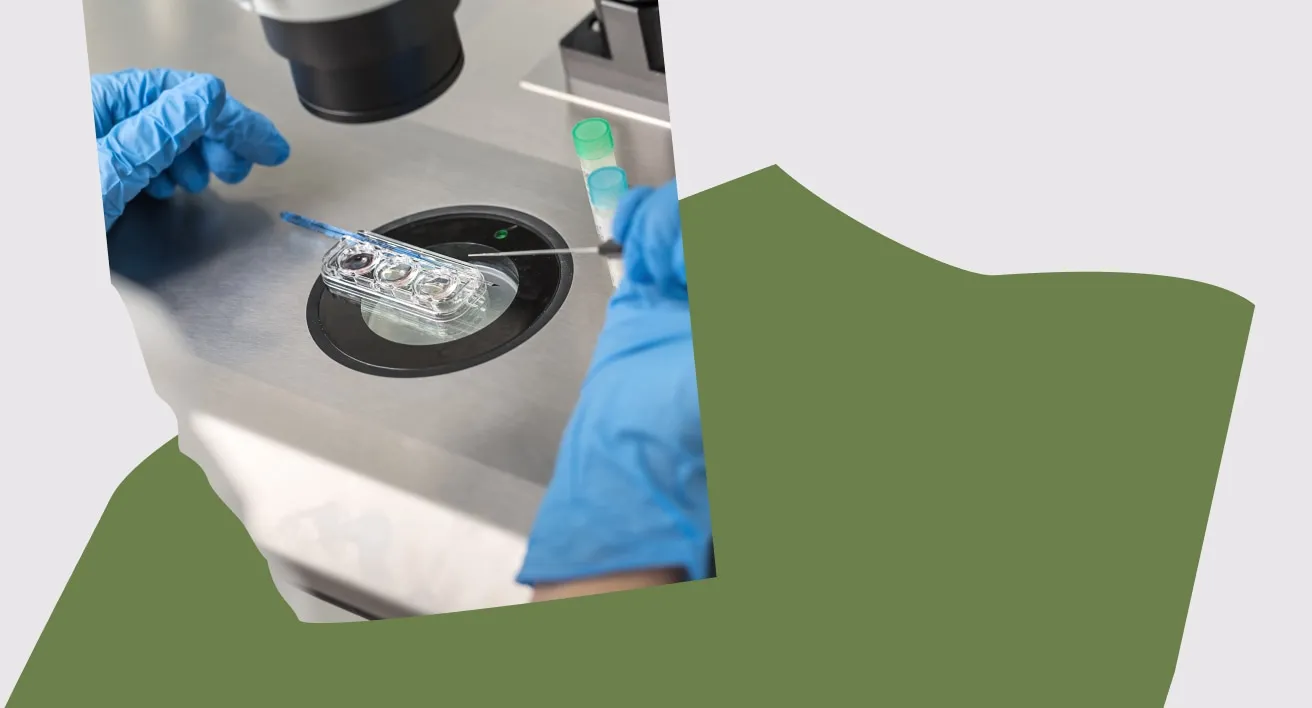IVF with or without ICSI: what's the difference?

IVF with or without ICSI summary
IVF helps people who need assistance fertilizing eggs with sperm. It’s done by combining an egg and sperm in a lab, then implanting the fertilized egg into a woman’s uterus.
ICSI is a procedure done on top of IVF. It addresses male factor fertility issues and can help address sperm quantity or quality concerns.
Your doctor will tell you if ICSI is an appropriate treatment for your situation.
Some clinics offer packaged pricing for IVF and ICSI together. Ask your clinic for more details.
In vitro fertilization (IVF) is a treatment available to people with female fertility factor concerns, or anyone that needs assistance fertilizing eggs with sperm. Intracytoplasmic sperm injection (ICSI, pronounced “ixy”) can be used on top of IVF to address male factor issues. The two can be used together, so depending on your fertility concerns, your doctor might recommend IVF with ICSI.
Think of IVF as the overall treatment and ICSI as a procedure on top of the IVF treatment.
We’ll break down both procedures and review how they can work together to fertilize eggs.
What are the differences between IVF with and without ICSI?
There are two main differences between them:
- What it addresses: ICSI is specifically done to address male fertility concerns, whereas Standard IVF is a good choice to address female factor issues. Standard IVF is also an option for anyone that needs assistance fertilizing eggs with sperm.
- How the egg is fertilized: In ICSI, a doctor selects one sperm and injects it directly into an egg to fertilize the egg. In IVF, an egg and sperm from a semen sample are placed in a petri dish, and the sperm fertilizes the egg without further human intervention.
ICSI and IVF procedure process
ICSI and IVF go hand in hand, and for men, the process is the same — provide a semen sample, and the lab will take care of the rest. For women, there are options: use her own stored frozen eggs; use donor eggs; or go through a cycle of egg retrieval and use fresh eggs.
IVF is a several step process that involves stimulating the ovaries with hormones to produce multiple eggs, retrieving those eggs, fertilizing the eggs in a laboratory to become embryos, transferring a mature embryo to a woman’s uterus to carry to term, and storing any additional embryos for later use. From stimulation to transfer, it takes about two months.
ICSI is done on top of an IVF cycle to improve the chances of fertilizing an embryo. Here’s how it works: A man produces a semen sample, and a doctor will look at the sample in a lab to select the best quality sperm. For the best possible chance of a healthy embryo, a doctor will inject the single best quality sperm into an egg in the lab.
If all goes well, the sperm and eggs will fertilize and mature into healthy embryos over the course of a few days. A doctor will implant one of the mature embryos into a woman’s uterus. If the lab fertilizes multiple embryos, the rest can be stored and frozen for later use.
If the sperm and egg don’t fertilize into a mature embryo, you can try again with more eggs, whether they’ve been frozen and stored or are fresh from another egg retrieval. Your doctor will have the best advice for your next steps.
IVF and ICSI procedure: Similarities and differences
IVF and ICSI procedures are very similar — realistically, the difference is what happens in the laboratory!
IVF and ICSI procedure differences
- In ICSI, a doctor injects one sperm directly into an egg to fertilize the egg. In IVF, an egg and sperm are both placed in a petri dish and can fertilize on their own.
- ICSI patients have a slightly increased risk for multiple pregnancies, like carrying twins or triplets, and a slightly increased risk for birth defects. Overall, the risk is very low.
IVF and ICSI procedure similarities
- Both procedures are done by fertilizing fresh or frozen eggs in a lab, then transferring embryos to a woman’s uterus.
- Both procedures can be completed over the course of a few weeks.
Treatment suitability
Your doctor will tell you which fertility treatment is right for you, but in some cases, there are specific reasons to choose ICSI.
Who is IVF suitable for?
Because IVF uses one partner’s sperm and another partner’s eggs, it is a suitable option for heterosexual couples with female factor fertility concerns, and it can be used by anyone who needs help joining an egg and sperm. People that choose IVF can use either their own, or a donor’s, eggs and sperm to create embryos in a lab and implant them into a woman’s uterus.
Who is ICSI suitable for?
IVF with ICSI is a suitable option for heterosexual couples with male factor fertility issues. It’s not necessary for people who are using sperm from a sperm bank, because sperm from a bank has been pre-screened for quality.
It’s also suitable if you’re thawing and using frozen eggs. In many cases, you’ll need to do ICSI to be able to effectively fertilize an egg that’s been frozen and thawed.
ICSI and IVF success rates
ICSI and IVF are both very successful options for fertility treatment — in fact, many clinics don’t publish separate success rates for ICSI and IVF because the statistics are so similar.
That said, ICSI won’t meaningfully help improve your chances of success unless you have a male factor fertility concern.
Is ICSI more expensive than IVF?
Yes, because ICSI is a procedure that can be done on top of IVF. ICSI generally costs $2,400 per procedure, and Standard IVF generally costs around $19,000 per cycle, including medications and all essential procedures.
The one exception is if you’re thawing and using previously frozen eggs — if that's the case, you won’t need to go through an egg retrieval. Previously frozen eggs need to be fertilized using ICSI, which costs about $2,400 per procedure.
Summary
IVF treatment and an ICSI procedure on top can help improve the chances of conception. They work together to target male factor (ICSI) and female factor (IVF) concerns and can help join eggs and sperm to create healthy embryos.






